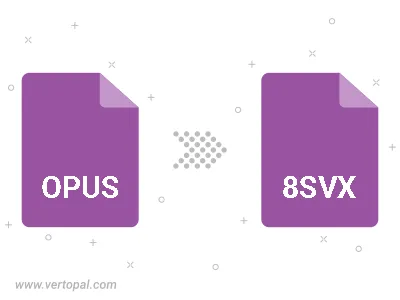Convert OPUS to 8SVX
Convert OPUS audios to 8SVX format, edit and optimize audios online and free.

Opus, associated with Opus Audio, is an open, royalty-free audio codec designed for high-quality voice and music streaming. Introduced by the Internet Engineering Task Force (IETF) in 2012, it adapts seamlessly to various applications like VoIP, videoconferencing, in-game chat, and live music performances. Known for its versatility, low latency, and high compression efficiency, Opus is widely adopted in modern communication platforms and web applications, making it a cornerstone in contemporary audio technology.
The 8SVX (8-Bit Sampled Voice) file format, developed by Electronic Arts as part of the Interchange File Format (IFF) standard, is used for storing 8-bit pulse-code modulation (PCM) audio on Amiga computers. Introduced in the 1980s, it was primarily used in video games, multimedia applications, and digital sound processing, enabling efficient sound playback. 8SVX files supported compression and multi-channel audio, making them ideal for memory-limited environments. Despite advancements in audio technology, 8SVX remains significant in retro computing and emulation, preserving Amiga's audio heritage.
Drag and drop a OPUS file into the upload area to start conversion.
Finalize the OPUS to 8SVX conversion by applying tools and clicking Convert.
Give the converter a few seconds, then download your 8SVX file.

Trim & cut OPUS and convert it to 8SVX.
After setup, the Vertopal CLI tool converts OPUS audio seamlessly into 8SVX audio.
cd to the OPUS folder or include the path.